In late July, I attended the annual meeting of the Association of Librarians and Archivists at Baptist Institutions (ALABI) in Providence, Rhode Island. ALABI’s sessions included presentations on data transfer and migration, preserving the Southern Baptist Convention Radio and Television Commission records, Baylor’s Black Gospel Music Preservation Project, and outreach and community engagement through exhibits. In addition, we viewed the 1847 document “A Resolution and Protest Against Slavery, March 2, 1847” from the Archives of the American Baptist Churches of Massachusetts. Rebecca (Zooming in from New Hampshire) and I gave our presentation “Creative Methods of Creating Partnerships & Expanding Access.” It follows below!
Finally, I had the opportunity to tour the First Baptist Church in America–it was a strikingly beautiful building and we also listened to a concert by the organist. The church was constituted in 1638 and built in 1775.
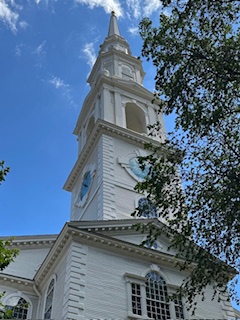
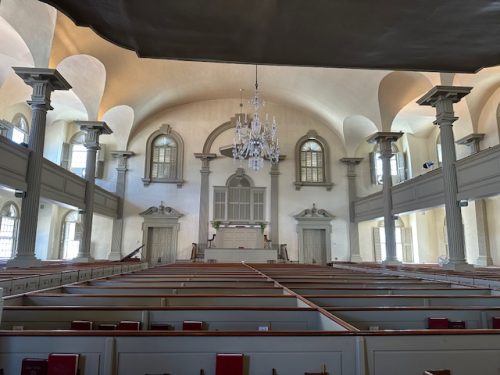
Creative Methods of Creating Partnerships & Expanding Access
Introduction (Tanya)
The North Carolina Baptist Historical Collection, housed in Special Collections & Archives (SCA) at Wake Forest University, serves as a central repository documenting the history of Baptists in North Carolina. Our collection includes thousands of church records, organizational minutes, manuscripts, books, journals, and other serials that reflect over 300 years of Baptist faith and activity in the state.
Beyond traditional preservation and access, we have begun leveraging new tools—such as Quartex—to provide better digital access to our materials. We’re also exploring partnerships that allow us to improve discovery and build community connections. In this presentation, we will highlight several collaborations, including working with vendors and a local university, which have helped us accomplish these goals.
Backstage Library Works
One of our earliest outsourced projects was with Backstage Library Works, a vendor offering services such as authority control, cataloging, collection management, and digitization. I managed a cataloging project during the pandemic focused on our original college library volumes—books from the university’s earliest years that feature a distinctive bookplate. As the campus prepared to shut down, I frantically photographed title pages and other essential bibliographic details and uploaded them to a shared Google Drive folder for Backstage. Their team then created catalog records, which we later integrated into our library’s OPAC. Without this partnership, we would not have had the staffing capacity to catalog over 400 additional titles, many of which required original records. They provide a unique record of a Baptist institution’s early efforts to build an academic library collection.
We also continue to work with Backstage to digitize microfilm for researchers. Given the high cost of digitizing our entire microfilm collection—over 3,000 reels—it’s not feasible to convert everything. Many of these reels were loaned to Wake Forest by individual churches, so they could be microfilmed. Because many churches have lost their original records or patrons are unable to travel to Winston-Salem, we coordinate with them to digitize specific reels. Backstage performs the digitization; the researcher or church typically covers the cost (approximately $90 per reel), and we host the digital files online. This model allows us to meet individual research needs while incrementally increasing public digital access for others.
From the Page (Crowdsourced Transcription)
Since 2021, we have used From the Page, a crowdsourcing platform that enables volunteers to transcribe, index, and describe historic documents. Currently, over 60 volunteers from around the world are working on our materials. They have successfully transcribed our early Board of Trustees records (1834–1890) and have since begun working on selected Baptist church records.
While this project requires ongoing communication, quality control, and review of transcriptions, it is work we would otherwise be unable to undertake due to limited staffing. Once the transcriptions are completed, we download them for long-term access through our institutional repository and/or Quartex.
UNCG Capstone Projects
SCA has partnered with the University of North Carolina at Greensboro’s graduate programs in information science and public history. Each graduate student completes a Capstone Project—a supervised fieldwork experience culminating in a portfolio which is part of their graduation requirement.
In the summer of 2024, student Ethan Kline digitized four boxes of the Samuel and Sally Wait Papers (Samuel Wait was the first president of Wake Forest University) and created associated metadata for the collection. Collaborating on Capstone Projects provides valuable real-world experience for graduate students while enabling us to complete projects that otherwise would be delayed.
Rebecca will now share details about another Capstone project, which focused on Hephzibah Baptist Church. This church’s records were digitized as part of SCA’s 2015 Library Services and Technology Act grant. Located in Wake County—the original home of Wake Forest University—Hephzibah Baptist Church had deep ties to the university, including church leader John Purifoy, an officer of Wake Forest. The congregation included both enslaved and free people, and its records provide a rich source for understanding local and institutional Baptist history. Rebecca will share more specifics about this project.
Hephzibah Baptist Church: A Digital History Collaboration (Rebecca)
In the fall of 2024, we were approached by Mary Kate Mauney, a Public History graduate student at UNC Greensboro, with an exciting research proposal involving the Hephzibah Baptist Church records. She wrote:
“Freedom From, Freedom To” will be a digital history project and commemorative event that unveils the lives of 16 free people of color who were all members of Hephzibah Baptist Church in Wake County, North Carolina. Through archival analysis of Hephzibah’s church minute book, along with the exploration of census records, marriage licenses, and wills, this project highlights an understudied community and provides insight into what life was like for free people of color in the state during the 19th century.”
We were immediately excited by the depth of Mary Kate’s research and the opportunity to collaborate. Our initial conversations began with an onsite visit, where we discussed the use of our From the Page transcription platform and explored possibilities for building a website on the Wake Forest University domain using WordPress.
Over the course of her project, Mary Kate met with several members of our team—including Emily, Kyle, Kevin, and myself—to gather insights and guidance. Her work centered on one of the many digitized church records housed in the North Carolina Baptist Historical Collection, a rich and layered archive within Special Collections & Archives.
Mary Kate made full use of From the Page, a platform we’ve recently adopted, to transcribe church minutes. She further enriched the context of these records through extensive research using census data and other primary and secondary sources.
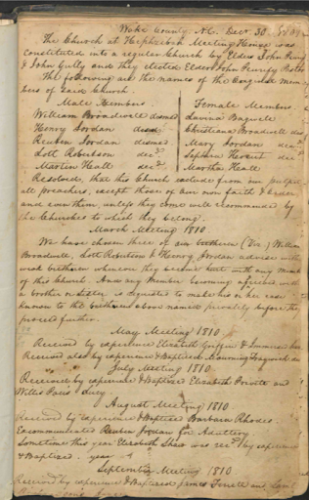
We have about 120 original church manuscript collections digitized, as Tanya mentioned earlier. We house these in our digital collections site, and this is where Mary Kate discovered the Hephzibah Baptist Church records. When we began using From the Page for transcription, we first loaded early Wake Forest College Board of Trustees records first, and then we began to put church records in for volunteer transcription.
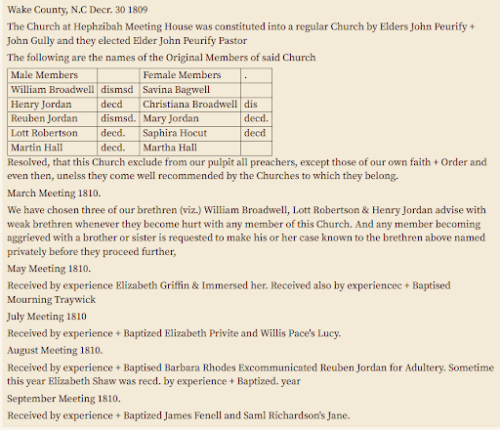
You can see the transcribed page of the first page of the 1809 Hephzibah Baptist Church Records. Some of the difficulty, beyond handwriting, is how to make these tables in the transcribed records. We have put together extensive help documentation for our over 60 volunteers to learn how to make this happen. We also review transcriptions before approving them for public view.
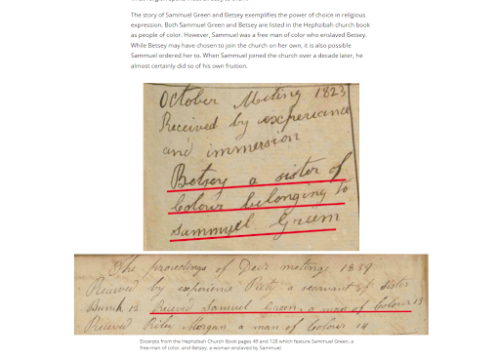
Here you can see excerpts from Mary Kate’s online exhibit. These church minutes are very rich and include all variety of church members. The lives of free people of color, enslaved members, and white members all show up throughout the records. This intrigued Mary Kate, as her research focused very narrowly on free people of color and their lives within the church membership and beyond. She transcribed very specific passages about the subjects of her research- as her research was focused on a very specific topic and time period in the history of the church.
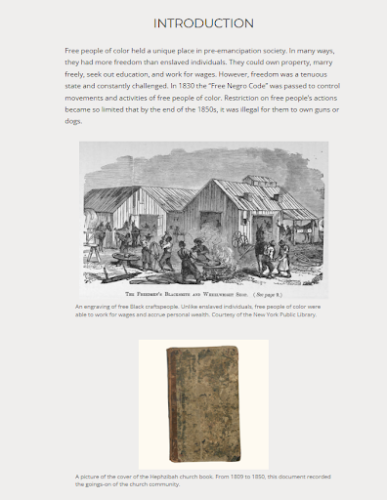
She also went beyond the church records to place her research in context by researching photographs, and census records. Here she shows an image from New York Public Library as well as additional research from census records and beyond. This project and research all started from her discovery of Hephzibah Baptist Church records in our digital collections.
As the transcription has continued to illuminate the ins and outs of this church prior to, during, and post Civil War, it is evident that this single church minute book is RIPE for future research.
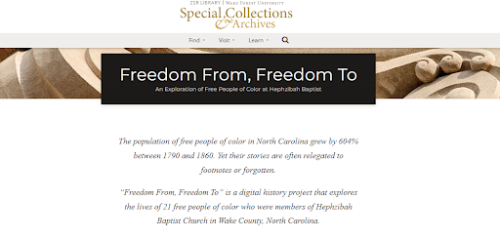
The final product of her capstone “Freedom From, Freedom To” is an engaging and insightful website hosted by WFU that tells the story of the free people of color associated with Hephzibah Baptist Church. It’s a remarkable example of how researchers can engage with our collections, contribute new understanding, and expand the impact of archival materials.
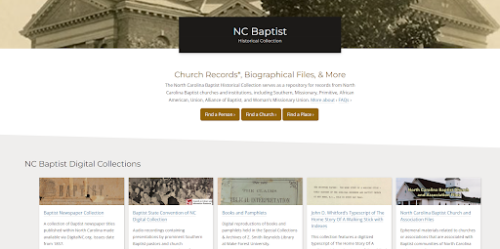
The Baptist Portal is where we showcase all of our collections related to the NC Baptist Historical Collection. We have collections that we digitized in house, like the Hephzibah Baptist Church, collections that are digitized and hosted through partnerships elsewhere, like the Religion in North Carolina Project and the Biblical Recorder (although we will be hosting the Biblical Recorder in Quartex soon), and a variety of other NC Baptist Historical materials like church and association files, finding aids, and Baptist State Convention recordings. This is also the final destination for when the From the Page transcriptions are complete, they will be added to the exhibiting digital collections for research use.
Conclusion (Tanya)
These partnerships matter because they significantly amplify the work we are able to accomplish—often in ways we couldn’t manage on our own. While challenges certainly exist—such as securing funding and grant resources, managing communication with external partners, and dedicating valuable staff time to oversight—the benefits far outweigh the difficulties.
Collaborations enable us to extend our capacity, deepen community connections, and broaden our reach. Most importantly, they enhance access to our collections for patrons, fostering richer research opportunities and driving new discoveries in the archives. These partnerships not only support our mission but also reinforce the value of shared stewardship in preserving and promoting access to historical records.”
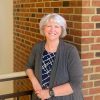
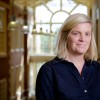
2 Comments on ‘Creative Methods of Creating Partnerships & Expanding Access–the Association of Librarians and Archivists at Baptist Institutions (ALABI)’
Congratulations – a memorable report(s) on impressive ZSR Library achievements.
Thank you for sharing about this meeting, project, and presentation, Tanya! These partnerships and collaborations are so critical to our shared mission.